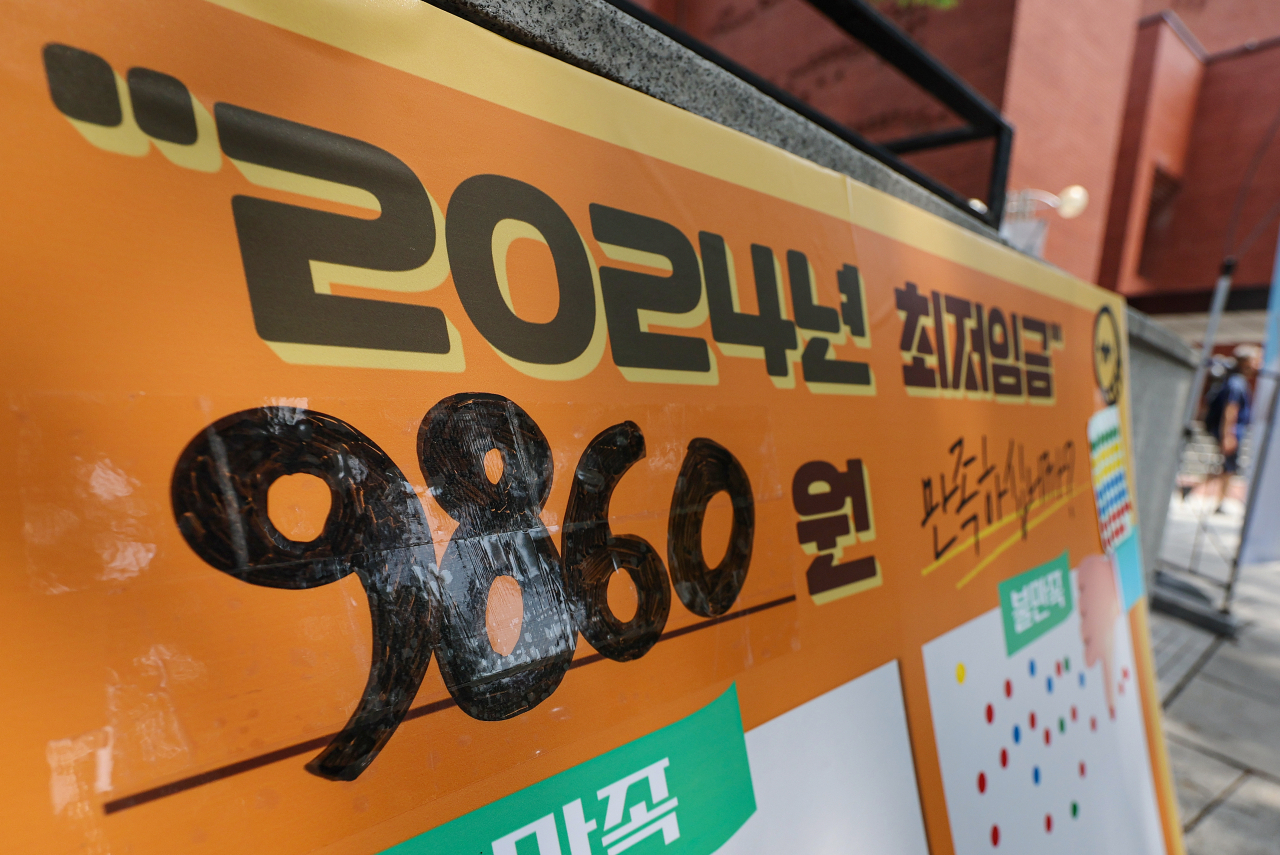Minimum wage set at 9,860 won: No one's happy
Labor, business both criticize outcome of longest-ever talks
By Im Eun-byelPublished : July 19, 2023 - 15:22

Korea has set its minimum wage level for 2024 at 9,860 won ($7.80) per hour, up 2.5 percent from this year’s 9,620 won. The raise would translate to a monthly income of 2.06 million won, based on a 40-hour workweek.
The decision was made early Wednesday following a 15-hour meeting of the Minimum Wage Commission, composed of members spanning labor, business and the general public.
Though eyes were on whether the minimum wage for next year would surpass the 10,000 won barrier, considering soaring prices and higher costs of living, the final figure was 140 won short.
Labor interest members on the commission proposed raising the minimum wage to 10,000 won, while the business side called for 9,860 won, eventually winning by a 17-8 vote with one abstention. It is assumed many of the public representatives on the commission sided with the business interest representatives.
“The minimum wage in Korea is considerably high. We should be proud of the wage reaching such a level,” Park Joon-shik, chairman of the Minimum Wage Commission, said at a briefing held shortly after the vote.
Korea’s minimum wage is the highest among the major economies in Asia, with Japan’s average at 961 yen ($6.89), Taiwan at 176 New Taiwan dollars ($5.66) and Hong Kong at 40 Hong Kong dollars ($5.12). But it is less than that of Germany at 12 euros ($13.48) and France at 11.52 euros ($12.94).
“If the minimum wage was half the figure of now, we could handle steep raises, but as the wage is high, a 2.5 percent raise leads to a significant increase,” Park said.
Yet the agreement was not well received, drawing fire from both labor and business representatives.
Four major business lobby groups here, including the Federation of Korean Industries and the Korean Chamber of Commerce and Industry, expressed the concern that the raise to the minimum wage could lead to an increased burden on small business owners.
“The decision was made in consideration of the impact on the economy and jobs,” the KCCI said through a statement issued in the name of its senior official Kang Seok-gu. “But the increased burden on small business owners who have been pushed to the brink is unavoidable.”
"The minimum wage raise will aggravate the burden on small businesses,” Choo Kwang-ho from the Federation of Korean Industries said. “It is likely there will be negative impacts on the jobs held by younger generations and lower-income groups that are heavily impacted by the minimum wage.”
The business circle also pointed out that the commission's discussion procedure should be changed.
“The decision-making process has to be fundamentally improved,” the KCCI said. “The current process which causes conflicts between the labor and business side and misses the legal deadline needs to be worked out.”
The Minimum Wage Commission had held discussions for 110 days, the longest term since the minimum wage was first introduced in Korea in 1988. The previous record was 108 days in 2016. The decision was made 20 days after the legal deadline, initially set for June 29.
The labor side also expressed discontent on the level of the wage raise, which fell shorter than initially expected.
“We are enraged that the minimum wage was raised at a historically low level,” said Park Hee-eun from the Korean Confederation of Trade Unions, representing the labor side on the commission.
The increase of 2.5 percent is the second-lowest rate hike seen since 1987, and still lower than the 3.3 percent consumer price growth rate for this year projected by the Finance Ministry.
"The raise, even lower than Korea's economic growth rate, is the same as cutting wages," said Ryu Ki-seob from the Federation of Korean Trade Unions, another labor representative.
The new rate is to take effect Jan. 1. Both labor and business sides can object and ask for a reevaluation before the new rate is made official, by Aug. 4. Yet no such reevaluation has ever occurred since the wage-setting system was introduced.




![[KH Explains] No more 'Michael' at Kakao Games](http://res.heraldm.com/phpwas/restmb_idxmake.php?idx=644&simg=/content/image/2024/04/28/20240428050183_0.jpg&u=20240428180321)













![[Herald Interview] Mistakes turn into blessings in street performance, director says](http://res.heraldm.com/phpwas/restmb_idxmake.php?idx=652&simg=/content/image/2024/04/28/20240428050150_0.jpg&u=20240428174656)
